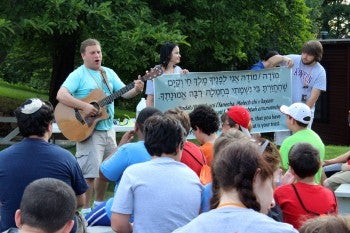 A funder collaborative set up to invest in community-based Jewish teen education initiatives has been “strikingly successful” in its first two years, with all participants reporting a high level of satisfaction, a case study commissioned by the Jim Joseph Foundation finds.
A funder collaborative set up to invest in community-based Jewish teen education initiatives has been “strikingly successful” in its first two years, with all participants reporting a high level of satisfaction, a case study commissioned by the Jim Joseph Foundation finds.
The report, Finding New Paths for Teen Engagement and Learning: A Funder Collaborative (14 pages, PDF), found that the Jewish Teen Education & Engagement Funder Collaborative — which was launched in 2013 to provide a platform for shared learning and collaboration among grantmaking professionals — has established a set of shared measures of success to guide program design and intended outcomes; secured additional funders for local initiatives; and fostered sustained learning and sharing among members. Led by the Jim Joseph Foundation and comprising fifteen funders in ten communities, including the Charles and Lynn Schusterman Family Foundation, the UJA-Federation of New York, and the Jewish Federations of Greater Los Angeles, Metropolitan Chicago, and San Diego County, the collaborative has funded initiatives in Boston, Denver/Boulder, New York, Chicago, and Los Angeles totaling nearly $32.8 million to date.
Prepared by Informing Change, the case study highlights four characteristics that have contributed to the collaborative’s success: a deep-rooted purpose, commitment to evaluation and shared learning, focus on national-local funding partnerships, and leadership. According to the study, the initial discussions benefited from strong leadership on the part of the Jim Joseph Foundation, as well as members’ early commitment of significant resources for grantmaking and initiative development. As the collaborative evolved, the report notes, members found value in its encouragement of customization to meet the needs of individual communities and its ability to raise issues such as measurement and evaluation that can be addressed collaboratively across communities.
“Bringing together ten different communities bound by the overarching pursuit of Jewish teen education and engagement — but each with their own internal structures, strategies, and goals — presents a truly unique learning opportunity,” said Ellen Irie, president and CEO of Informing Change. “The collaborative members are engaged in a dynamic, ambitious endeavor that involves learning about and implementing grantmaking strategies; understanding initiatives and programs that engage today’s teens; and creating an environment where funder representatives share challenges and insights for the benefit of others.
 It hasn’t achieved Starbucks-level growth, with a franchise on every corner. Not yet.
It hasn’t achieved Starbucks-level growth, with a franchise on every corner. Not yet.


 ATLANTA (JTA) — Over 3,000 teenagers from multiple Jewish youth groups gathered in Atlanta for a series of events aimed at strengthening Jewish identity among teens and rallying philanthropic support for such programs.
ATLANTA (JTA) — Over 3,000 teenagers from multiple Jewish youth groups gathered in Atlanta for a series of events aimed at strengthening Jewish identity among teens and rallying philanthropic support for such programs.

 In his op-ed, Rabbi Ari Segal portrays the quandary that most Jewish day schools, and especially Jewish high schools, find themselves in today in regard to their middle-income families (“The 1% Solution,” January 2). Tuition increases have well exceeded rises in wages, cost of living has increased greatly and middle-income families with multiple children in day school are simply not able to keep up.
In his op-ed, Rabbi Ari Segal portrays the quandary that most Jewish day schools, and especially Jewish high schools, find themselves in today in regard to their middle-income families (“The 1% Solution,” January 2). Tuition increases have well exceeded rises in wages, cost of living has increased greatly and middle-income families with multiple children in day school are simply not able to keep up.